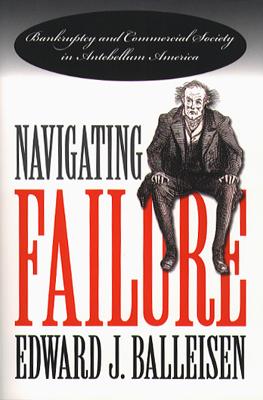

 University of North Carolina Press
University of North Carolina Press
Navigating Failure: Bankruptcy and Commercial Society in Antebellum America


Key Metrics
- Edward J Balleisen
- University of North Carolina Press
- Paperback
- 9780807849163
- 9.28 X 6.2 X 0.82 inches
- 1.11 pounds
- Business & Economics > Economic History
- English
 Secure Transaction
Secure TransactionBook Description
Balleisen makes innovative use of the rich and previously overlooked court records generated by the 1841 Federal Bankruptcy Act, building his arguments on the commercial biographies of hundreds of failed business owners. He crafts a nuanced account of how responses to bankruptcy shaped two opposing elements of capitalist society in mid-nineteenth-century America--an entrepreneurial ethos grounded in risk taking and the ceaseless search for new markets, new products, and new ways of organizing economic activity, and an urban, middle-class sensibility increasingly averse to the dangers associated with independent proprietorship and increasingly predicated on salaried, white-collar employment.
Author Bio
My research and writing explores the historical intersections among law, business, politics, and policy in the modern United States, with a particular focus on the origins, evolution, and impacts of the modern regulatory state. I have pursued a number of collaborative projects with historians and other social scientists who study regulatory governance in industrialized and industrializing societies.
My most recent book is Fraud: An American History from Barnum to Madoff (Princeton University Press, 2017). Economic duplicity has bedeviled American markets from the founding of the Republic. In this wide-ranging history, I emphasize the enduring connections between capitalist innovation and business fraud, as well as the vexed efforts by private organizations and state agencies to curb the worst economic deceptions. Placing recent fraud scandals in long-term context, I argue that we rely solely on a policy of caveat emptor at our peril; and that a mixture of public education, sensible disclosure rules, and targeted enforcement campaigns can contain the problem of business fraud. Fraud received the 2018 Ralph Gomory Prize from the Business History Conference.
A growing proportion of my writing engages interdisciplinary debates about the nature of regulatory policy more generally, as well as the evolution of dominant approaches to political economy in modern capitalist societies. This dimension of my scholarship led to the publication of Government and Markets: Toward a New Theory of Regulation (Cambridge University Press, 2010), which I edited along with the historian David Moss. This volume brings together several new conceptual approaches to regulatory governance from across the social sciences. It also lays out a wide-ranging research agenda for regulatory studies.
In 2015, my sole-edited three-volume multidisciplinary research collection, Business Regulation, came out with Edward Elgar. This collection includes a long introductory essay, “The Dialectics of Modern Regulatory Governance,” that conceptualizes the emergence of the modern regulatory state in the nineteenth-century and its evolution since then, often in response to powerful critiques from scholars and regulated businesses. It then provides over 100 leading writings on key aspects of regulatory governance, with selections that range from 1869 to the 2010s, and from across the social sciences.
Along with Duke colleagues and collaborators Jonathan Wiener, Lori Bennear, and Kim Krawiec, I have co-edited another recent interdisciplinary volume that examines when and how industrialized democracies reconfigure regulatory institutions in the aftermath of major crises. This book, Policy Shock: Recalibrating Risk and Regulation after Oil Spills, Nuclear Accidents, and Financial Crises, came out with Cambridge University Press in 2017.
I am especially interested in mentoring graduate students who wish to study the history of business-state relations, the regulatory state, business culture, political economy, and legal institutions. Although my research expertise lies particularly with American history from 1815 to the present, I have advised several graduate students who have pursued transnational dissertation topics, or who study other areas of the world. I am also now mentoring several graduate students in other social science disciplines.
Since 2015, I have served as Duke’s Vice Provost for Interdisciplinary Studies, working with university-wide institutes and initiatives to foster collaborative, interdisciplinary research, teaching, and engagement. In this capacity, I oversee Bass Connections, an innovative program that supports interdisciplinary, problem-centered research teams involving faculty, graduate students, and undergrads. I also served as the PI on Duke’s “Versatile Humanists” project, funded by a Next Generation Implementation grant from the National Endowment for the Humanities. This grant created a new model of complementary advising, established an internship program, fostered curricular innovation, and extended opportunities for doctoral students in the humanities to engage in collaborative research.
Source: Duke University
Videos








Community reviews
Write a ReviewNo Community reviews